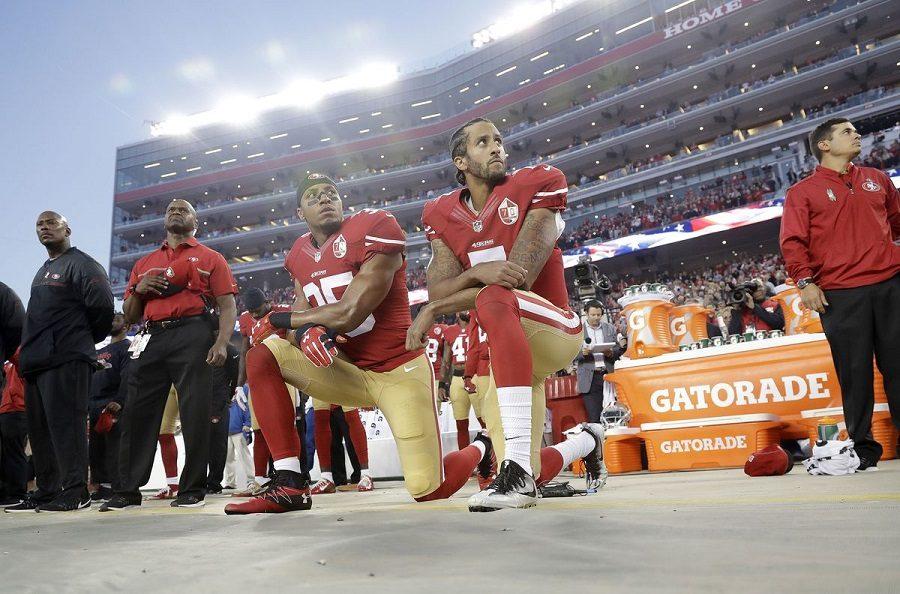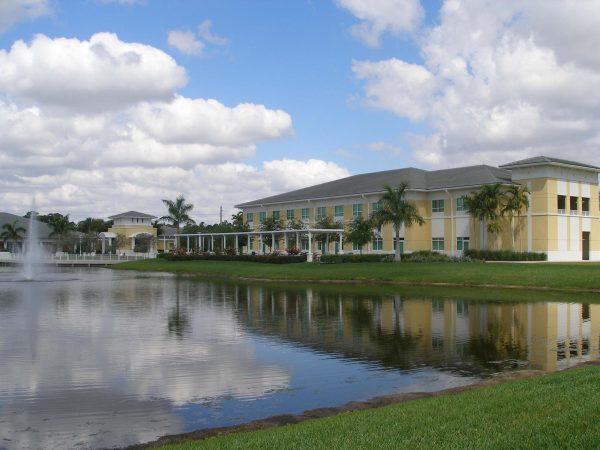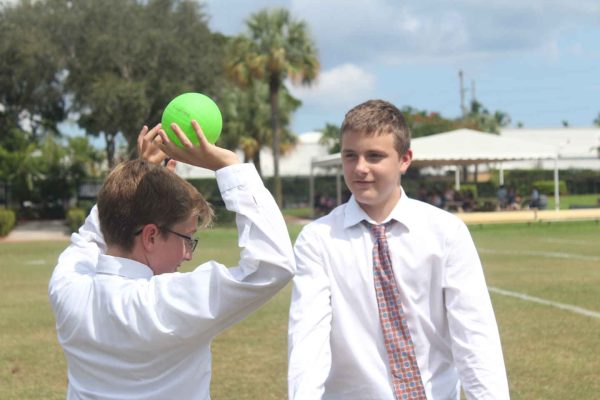Kaepernick’s Stance: Freedom or Folly?
Is the 49ers’ QB right in protesting social injustice during our nation’s national anthem?
Photo courtesy of mashable.com.
Colin Kaepernick (right) and teammate Eric Reid kneel during the San Francisco 49ers’ home opener against the Los Angeles Rams on September 12, 2016.
San Francisco 49ers quarterback Colin Kaepernick has taken a knee dozens of time in his career. However, by doing so during the national anthem, he’s stirred up quite a bit of controversy. Kaepernick, a six-year NFL veteran, began kneeling during “The Star-Spangled Banner” in this year’s pre-season games to protest what he believes to be the mistreatment of and injustice to African Americans. “I am not going to stand up to show pride in a flag for a country that oppresses black people and people of color,” said Kaepernick, who is of mixed race. “To me, this is bigger than football, and it would be selfish on my part to look the other way. There are bodies in the street and people getting paid leave and getting away with murder,” Kaepernick said, referencing a string of events that led to the “Black Lives Matter” movement. He added he would continue to protest until he feels “[the American flag] represents what it’s supposed to represent.
Other NFL players have followed suit by protesting during the first two weeks of the regular season, such as the Dolphins’ Arian Foster, Michael Thomas, and Kenny Stills, and Broncos’ linebacker Brandon Marshall – all of whom kneeled during the national anthem. In addition, New England Patriots’ safety Devin McCourty and tight end Martellus Bennett protested in a different way, raising their fists after the anthem played in a show of solidarity.
Even high school athletes are joining in. At Waggener High in Louisville, Kentucky, two football players, one black and one white, recently took a knee during the national anthem as their teammates stood alongside them.
It seems that everyone has an opinion about Kaepernick’s actions, some saying what he is doing is justified while others think it is disrespectful to America and those who have and continue to fight for its freedom. Clemson University Head Football Coach Dabo Swinney weighed in on Kaepernick’s protest, saying, “I think everybody has the right to express himself in that regard. But I don’t think it’s good to be a distraction to your team. I don’t think it’s good to use the team as a platform. I totally disagree with that. Not his protest. But I just think there’s a right way to do things. I don’t think two wrongs make a right. Never have, never will. I think it just creates more divisiveness, more division.”
Even U.S. President Barack Obama, at the conclusion of the G20 summit in China, was asked about Kaepernick’s protest. “I gotta confess that I haven’t been thinking about football while I’ve been over here and I haven’t been following this closely.” He continued, “But my understanding, at least, is that [Kaepernick is] exercising his constitutional right to make a statement. I think there’s a long history of sports figures doing so.”
So what do members of the Benjamin community think?
“I disagree with what Colin Kaepernick is doing because I think he should show respect to the country and national anthem,” said seventh grader Jake Zur. “Even though he is protesting racism, it is still wrong to do it during the national anthem.”
Others support Kaepernick’s right to protest peacefully. “I agree with what [Kaepernick] is doing and he has the right to do that for any cause that he wishes,” said Hagy. “And I celebrate that we live in a country where he has the freedom of expression to do that.”
While Benjamin and most other schools don’t sing the national anthem prior to games, the faculty and student body of the Middle School do recite the “Pledge of Allegiance” every Monday morning to begin assembly in the BPAC. Before it’s recited, Hagy usually asks the students and faculty to remember that there was a time when America’s citizens did not have freedom and were fighting for their independence.
Because of the way in which Hagy prefaces the “Pledge of Allegiance,” the students all seem happy to stand up proudly and pay respect to the flag and their country. He reminds students that saying the pledge is about demonstrating their gratitude for living in a free country, and not about our individual disagreements of how this country functions.
As President Obama alluded to, there is a long history of people exercising their freedom of speech. In 1943, during World War II, two grade school-aged sisters from West Virginia, Marie and Gathie Barnett, were expelled from school for refusing to salute the flag or say the “Pledge of Allegiance.” This was not because they did not like the United States, but they were Jehovah’s Witnesses and their religion forbade them from saluting or making oaths. The Supreme Court’s verdict, delivered by Justice Robert H. Jackson, ruled in favor of the sisters. Jackson noted, “If there is any fixed star in our constitutional constellation, it is that no official, high or petty, can prescribe what shall be orthodox in politics, nationalism, religion, or other matters of opinion or force citizens to confess by word or act their faith therein.”
In other words, because America is founded upon freedom, its law-abiding citizens have the right to dissent and cannot be forced to conform when it comes to making personal choices. To do so would contradict the very idea of freedom.
Regardless of what people think about Kaepernick’s form of protest, it has created strong feelings on both sides. Because we, the students at TBS, are young and are learning how to form our own political opinions, it is right for us as middle schoolers to say the pledge at assembly or join in during the national anthem as statements of gratitude to this great country. We have a lifetime to form our opinions and express them, and Colin Kaepernick’s actions show us that in this country, as we mature, we have the freedom to do so.










